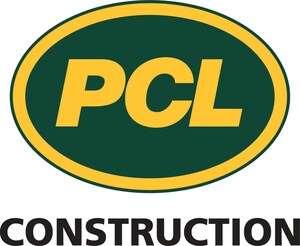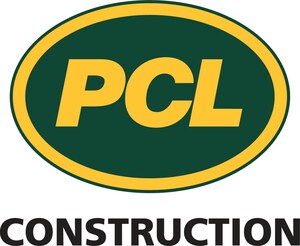Growth in civil infrastructure, manufacturing and solar markets will continue next year.
DENVER, Dec. 20, 2022 /PRNewswire/ - Rising interest rates and inflation coupled with the estimated 2 million jobs the economy could lose next year has many executives across the country concerned about recession. However, due to the continued pent-up demand in construction that the COVID-19 pandemic caused, and the investments from the federal government to U.S. infrastructure and manufacturing, Deron Brown, PCL Construction's president and chief operating officer, U.S. operations, predicts a soft recession in 2023. Brown provides his opinion on three recession-proof markets contractors should focus on:
"From aging infrastructure across the U.S. to increased funding for renewable energy as well as the high demand for manufacturing facilities, I see civil infrastructure (specifically water construction), manufacturing and solar as markets that will be able to withstand an economic downturn, should there be one," said Brown. "While we continue to diversify our work across other sectors, we can't ignore the increased demand and exponential growth we are seeing across the country within these markets."
Driven by aging infrastructure, extreme growth, climate change and environmental regulatory changes, the demand for civil infrastructure projects, specifically water projects across the country continues to rise. For PCL Construction's Civil Infrastructure division, the group secured record-breaking new work in 2022 – a 50% increase from 2021 – with this number anticipated to grow in 2023 and beyond.
"The Civil Infrastructure market is buoyant, especially when it comes to water," said Mike McKinney, PCL's senior vice president, civil. "In the next five years, we expect civil infrastructure to continue to be an extremely healthy market for our company – there are a lot of opportunities out there and we are excited to capitalize on them."
In states like Florida and California, climate change and extreme growth coupled with a limited amount of fresh water are all reasons the demand is outpacing availability. Therefore, water reuse facilities that can recycle every bit of water or wastewater are a major market driver.
"Recently, we have seen a shift in more political will to fund these necessary projects because if something isn't done to understand and improve our water conditions, there will be long-term repercussions. We can't keep building and expect the water to be there," said McKinney.
With funding from the Infrastructure Bill, Inflation Reduction Act and Creating Helpful Incentives to Produce Semiconductors for America (CHIPS) Act, there is more capital for water infrastructure projects which will be helpful for states like Arizona who are being asked to reduce water intake from the Colorado River by more than 20% and need to find an alternative source.
The CHIPS Act is also driving a lot of water infrastructure projects because these manufacturing facilities have a high-water demand. These projects can no longer just rely on local municipalities for water usage but must investigate other avenues such as water reuse.
Fueled by demand both domestically and by exports, and supported by the U.S. Infrastructure Investment Act, CHIPS Act and Buy American Legislation, the onshoring and reshoring of U.S. manufacturing investment is expected to continue. Manufacturers are placing more trust in their regional economies and are looking for supplier relationships closer to home – a contributing factor to the projected 8-15% growth in new manufacturing projects next year and an estimated four million manufacturing jobs needed by 2030.
In 2023, Andrew Ahrendt, PCL's director of manufacturing predicts growth within food and agriculture, pharmaceuticals and manufacturing life sciences as well as advanced device manufacturing:
- With growing destabilization in historic food supply chains like Ukraine and changing environmental conditions, new advances in food science and proteins is needed to support the more than 8.5 billion global population by 2030.
- With increased demand for life saving medicines, cancer drugs and to prepare for a future pandemic, there will be a continued focus on life science research and production throughout the country to keep our aging populations safe.
- Growth in advanced device manufacturing, including semiconductor foundries and medical device production facilities, will continue in the U.S. Additionally, cleanroom construction will continue to ramp up as electronics and defense industries demand increases.
"According to National Association of Manufacturers, 63% of U.S. manufacturers surveyed reported a need to expand operations and invest in technology and infrastructure in 2023," said Ahrendt. "Continued government investments over the next two years at a minimum; investments in technology, automation and robotics; increased confidence in supply chain reliability and security; plus, the increased demand for sustainable products are all contributing factors to the growth we are seeing within this market."
U.S. utilities are expected to triple battery storage capacity by 2025 – a driving force for PCL Construction as the company looks to expand not only solar operations but Battery Energy Storage System projects (BESS). With increasing global renewable energy demands given the Inflation Reduction Act (IRA), the need to store excess energy generated by renewable energy sources like solar is also on the rise and PCL's formalization of its solar operation couldn't have come at a better time.
Next year, the company plans to work on seven to nine U.S. solar projects at any given time – the most PCL has managed to date. PCL is expanding their work geographically and will begin work in new areas in 2023 such as in Arkansas – where the team will build a 241-megawatt direct current solar farm on more than 1,700 acres – and in the Pacific Northwest.
With this projected growth in solar and Battery Energy Storage System (BESS) projects comes the need to grow PCL's solar team, especially as the company continues to self-perform 75% of work on solar projects.
"In 2023 alone, we plan to expand our team by at least 20% to support the business goals of reaching $1.5 billion of revenue by 2025 – a goal that has been set with responsible growth in mind," said Rodolfo Bitar, business development manager for PCL's solar operations.
PCL is a group of independent construction companies that carries out work across the United States, Canada, the Caribbean, and in Australia. These diverse operations in the civil infrastructure, heavy industrial, and buildings markets are supported by a strategic presence in more than 30 major centers. Together, these companies have an annual construction volume of more than $6 billion USD, making PCL one of the largest contracting organizations in North America. Watch us build at www.pcl.com.
SOURCE PCL Construction

WANT YOUR COMPANY'S NEWS FEATURED ON PRNEWSWIRE.COM?
Newsrooms &
Influencers
Digital Media
Outlets
Journalists
Opted In




Share this article